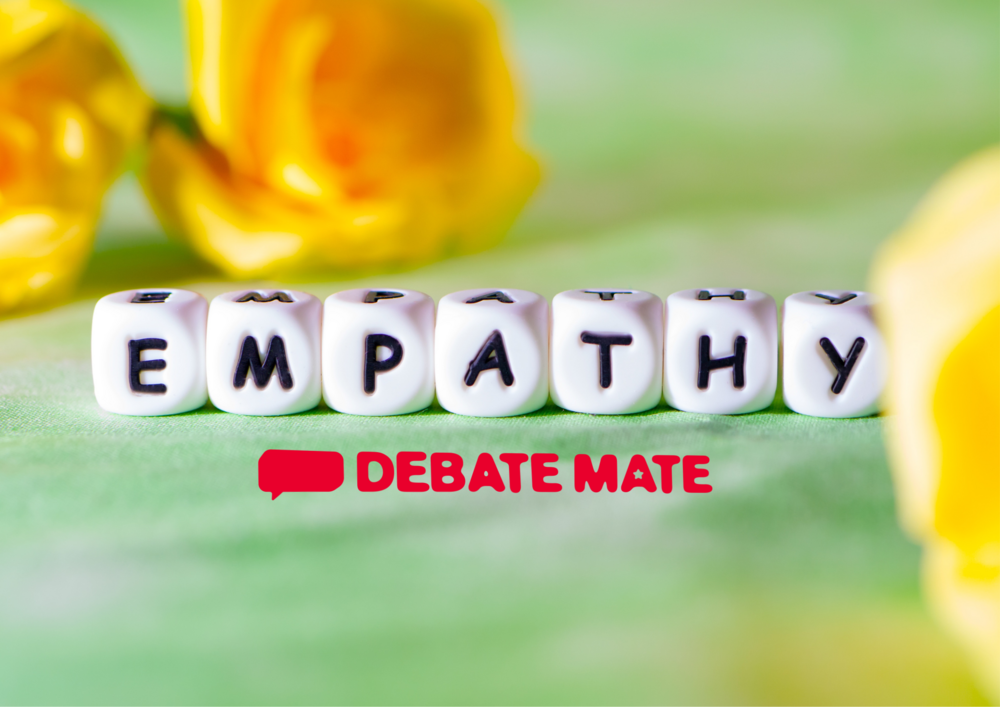Read on to learn exactly why this skill is so valuable in our 21st Century world and crucially, how Debate Mate can help develop it in YOUR child!
According to the Oxford English Dictionary, empathy is defined as...
"the ability to understand and share the feelings of another."
The ability to empathise with others is undoubtedly valuable when it comes to interacting with other people.
Empathy allows you to...
-
Actively listen👂🏼- being an empathetic person requires you to actively listen and respond to what other people say to you.
-
Be a better team player 👫 - being sensitive to the emotions of your peers makes you much easier to get along with and a valuable team player.
-
Be a better leader 🗣 - if you're able to put yourself in the shoes of your team, you'll be better able to understand their strengths, weaknesses and working style. This will allow you to manage them in the most productive way possible.
-
Respect and engage with people who are different to you 🤝 - Empathy allows for cultural relativism and a greater understanding of difference. For example, understanding people’s norms, values and beliefs based on their background and not judging them by personal, subjective standards and beliefs.
To summarise, empathy helps you be a better leader, a better team player, a better communicator and most importantly, a better person all-round. This makes it a hugely crucial, and chronically overlooked, future skill!
Fortunately for our Debate Mate students, debating is a brilliant methodology to develop empathy in young people.
Here's how our courses develop these crucial leadership skills...
Responding to the arguments of others:
- A crucial skill taught across our Debate Mate curriculums is the ability to actively listen, critically analyse and thoughtfully respond to the arguments of others.
- Students are taught to do this through 2 key debating techniques.
- The first is rebuttal. This involves identifying a key part of the preceding speaker's speech that you disagree with, explaining why you think they're wrong and summarising how this strengthens the case for your own team. Speakers present their rebuttal at the beginning of their debating speech before moving on to their pre-prepared argument.
- The second way is Points of Information. These are short interjections into the speech of your opponent, usually posed as a question and less than 10 seconds in length. They're useful for challenging your opponent on the spot and showcasing the strength of your own team's debating strategy.
- Both of these debating techniques require you to actively listen and empathise with the arguments of your opponent.
- To empathise in debating is to put yourself in the shoes of the opposing team, pre-empt the arguments they'll make and get one step ahead of them by debunking some of their key arguments in your own speech.
Our Global Classroom:
- Our clubs are a multi-cultural global classroom, combining students from all over the world in one diverse Zoom call!
- We currently have students from over 33 countries in our virtual clubs, a number that keeps on increasing every term.
- To have a student from one of the top private schools in the UK learn from and debate with a student from one of the most deprived areas of Kathmandu broadens our students’ worldviews, develops their empathy and encourages mutual respect for people who are different to them.
- This ethos extends to our inspiring team of university mentors, who reflect the incredible diversity of our students.
Ultimately, empathy is an extremely important debating skill that has huge application to your child's future, allowing for academic, social and career success!
🚀 At Debate Mate, we believe that empathy is a hugely valuable skill instrumental in helping your child realise their full potential. Invest in their future NOW by signing them up to our courses- check them out
here!
